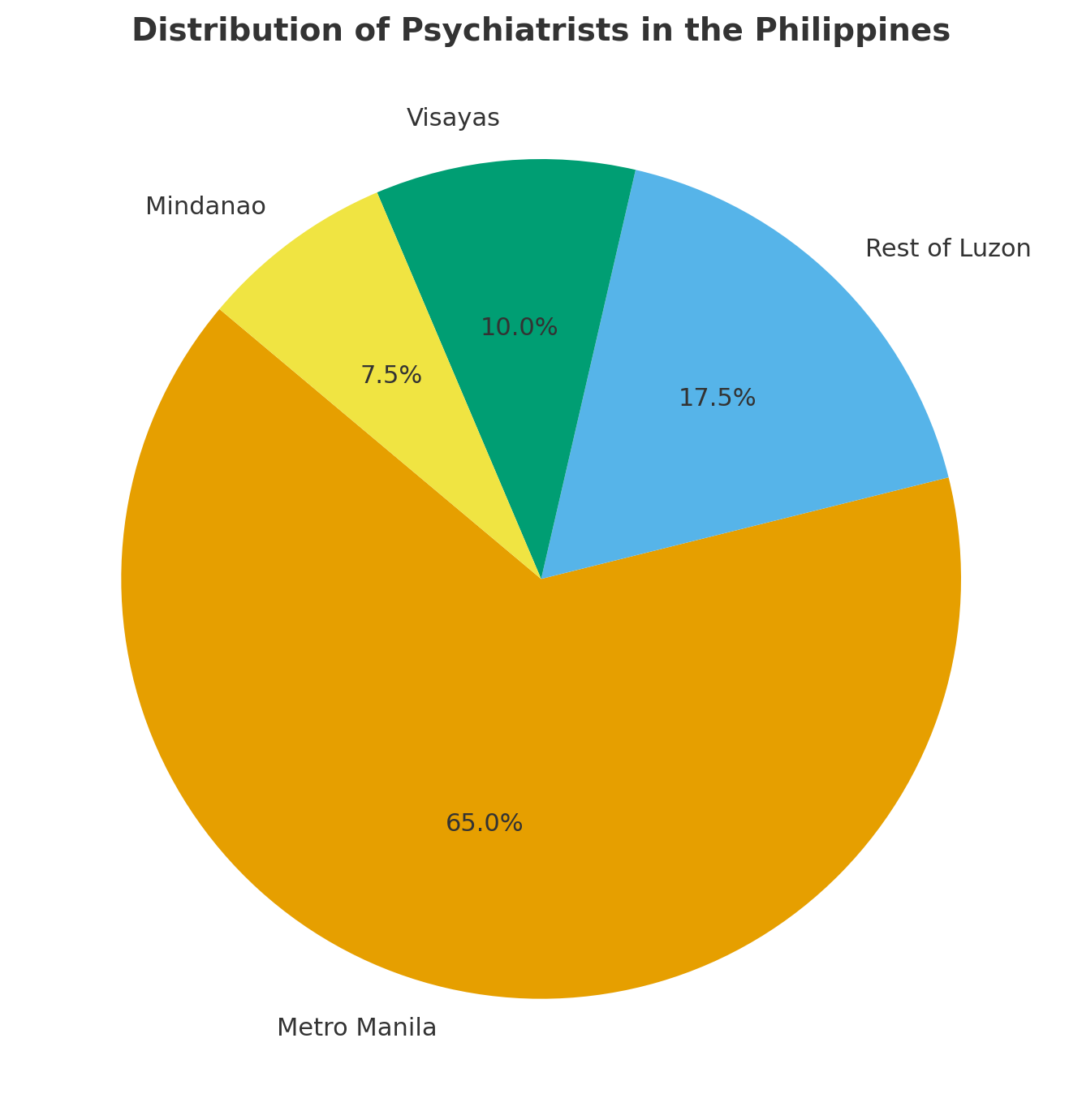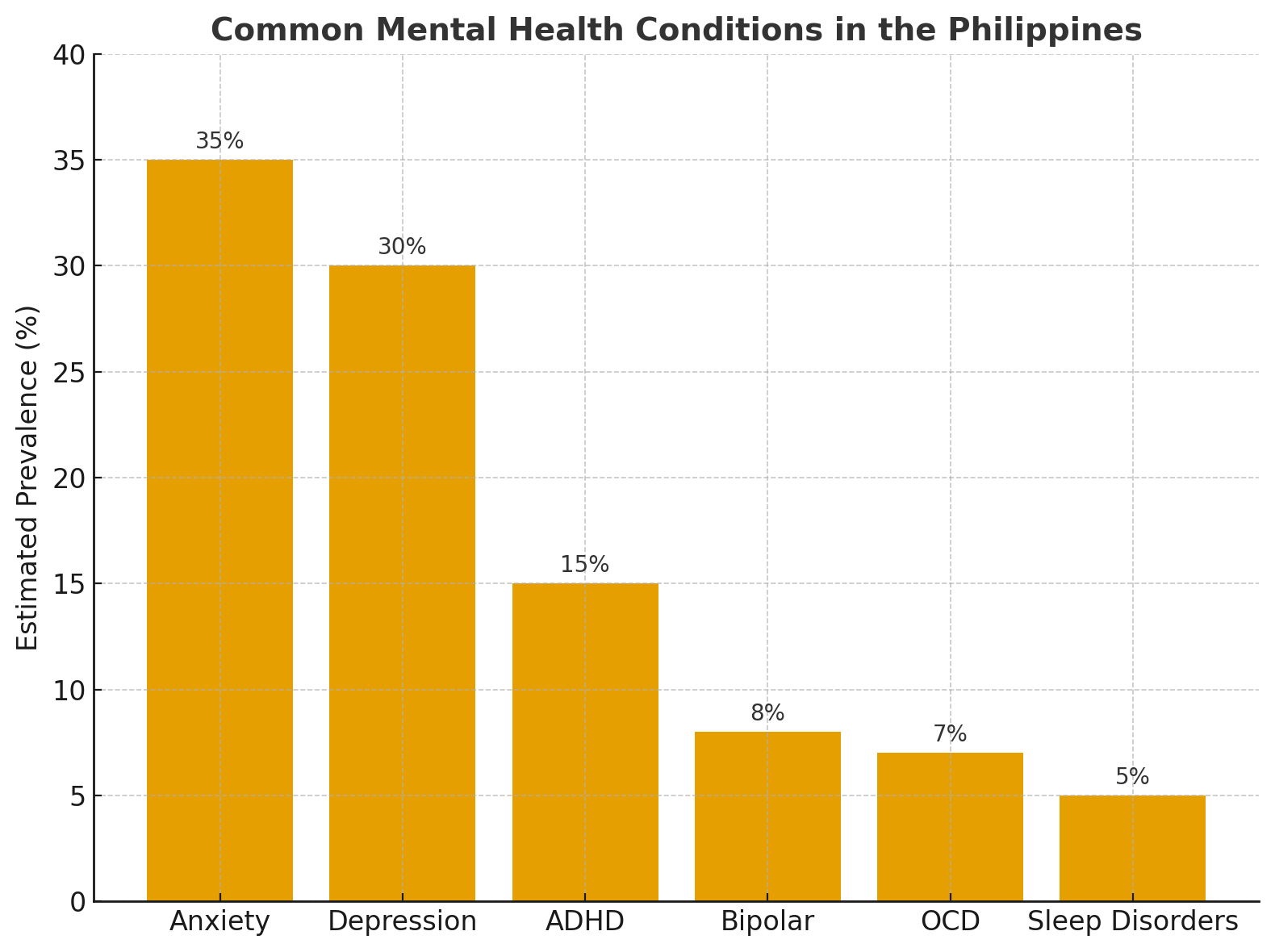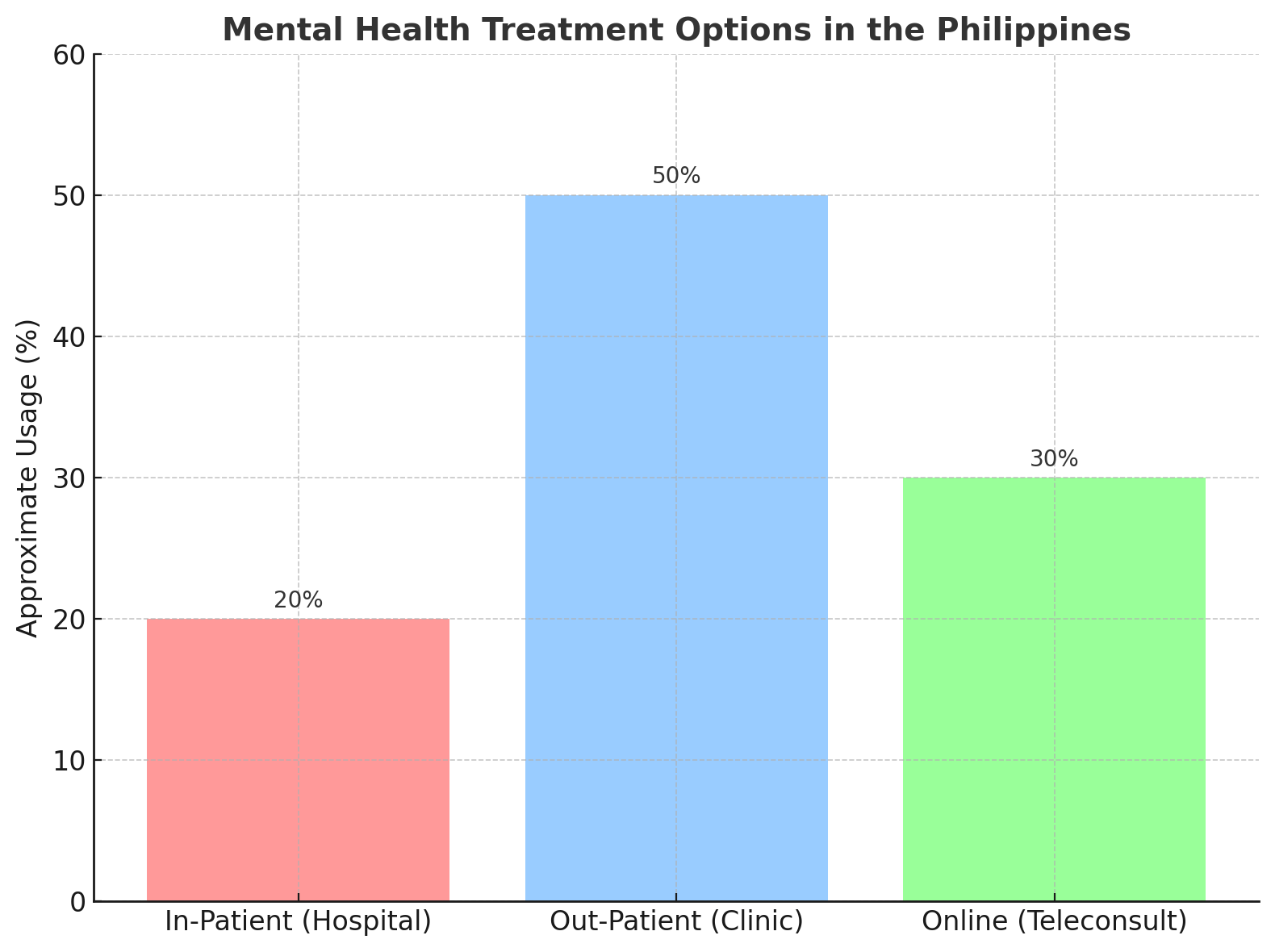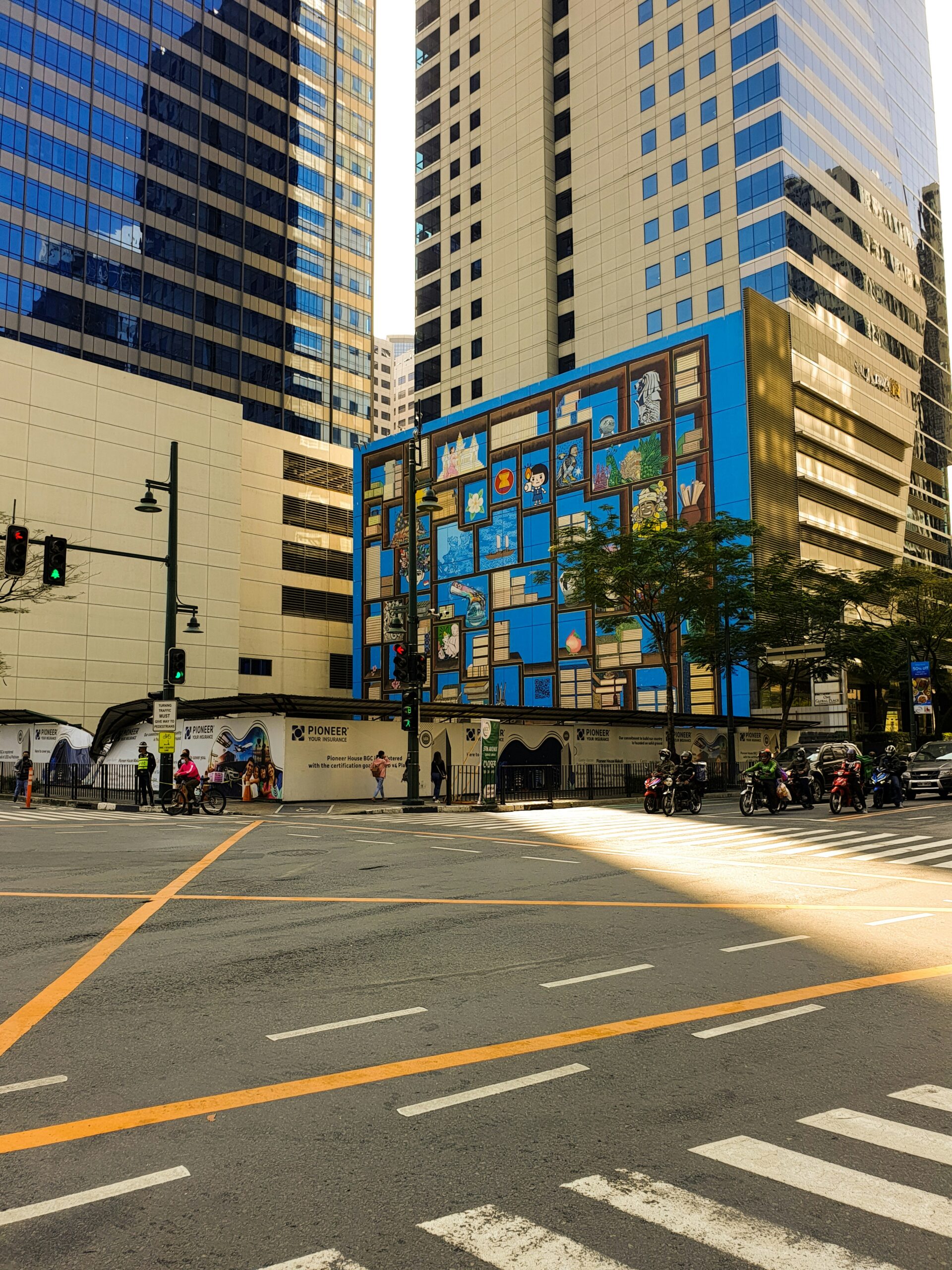Mental Health in the Philippines Today
Published: September 11, 2025 · Last updated: Sept 11, 2025

Mental health is an increasingly important concern in the Philippines. According to the World Health Organization (WHO), mental, neurological, and substance use disorders account for a significant share of disability in the country (read: WHO Philippines Investment Case). Conditions such as depression, anxiety, bipolar disorder, ADHD, and trauma-related disorders are now among the most common health issues, cutting across all age groups and income levels.
Why This Guide Matters
Despite the growing need, many Filipinos remain hesitant to seek help due to:
- Stigma – fear of judgment or misunderstanding.
- Accessibility gaps – most psychiatrists are based in Metro Manila, leaving rural areas underserved.
- Cost concerns – uncertainty about consultation fees, therapy costs, and psychological testing.
This guide was created to help you understand the landscape of mental health treatment in the Philippines, what options are available, and what you can expect in terms of costs and processes.
Legal & Policy Framework
In 2018, the government enacted the Philippine Mental Health Act (Republic Act No. 11036) to strengthen mental health care nationwide
Also read: Official Gazette RA 11036.
The law ensures the rights of individuals with mental health conditions and obliges public and private institutions to make services more accessible. However, implementation remains uneven, and most specialists are still concentrated in urban centers like Makati, Taguig, Mandaluyong, and broader Metro Manila.
The Role of Teleconsultation
The COVID-19 pandemic accelerated the adoption of telemedicine. Mental health, in particular, benefited from this shift: Filipinos outside urban hubs, or those concerned about privacy, now have access to online psychiatrists and psychologists across the Philippines. This hybrid model—in-clinic care for those who prefer face-to-face, and teleconsultation for nationwide access—has become the new standard of care.
Read: DOH Mental Health Program
What You Will Learn in This Guide
This comprehensive article will cover:
- The state of mental health services in the Philippines.
- Common mental health conditions affecting Filipinos.
- Treatment options: in-patient, out-patient, and teleconsultations.
- Costs of psychiatric consultations, therapy sessions, and assessments.
- Steps to seeking help, from recognition to follow-up care.
- Corporate solutions: Employee Assistance Programs (EAP).
- Frequently asked questions on psychiatrists, psychologists, and mental health treatment in the Philippines.
The State of Mental Health Care in the Philippines (2025)

The Philippines continues to face a serious shortage of mental health professionals. The Philippine Psychiatric Association (PPA) estimates there are only about 400 licensed psychiatrists for a population of more than 110 million. Most are concentrated in Metro Manila—particularly in Makati, Taguig, and Quezon City—leaving large rural areas underserved. This means patients in provinces often have to travel to major cities or rely on online consultations to access a psychiatrist or psychologist.
Disparities Between Urban and Rural Services
Urban centers like Makati, Mandaluyong, and BGC/Taguig host psychiatric clinics, hospitals with mental health departments, and independent psychologists. By contrast, rural areas have far fewer specialists and facilities, with many patients relying on general practitioners or community health workers. This uneven distribution reinforces the need for telepsychiatry and online consultations across the Philippines.
Stigma and Cultural Barriers
Even with the passage of the Mental Health Act (RA 11036), stigma remains a major barrier. Many Filipinos still associate psychiatric treatment with severe illness or “weakness,” discouraging individuals from seeking help early. Surveys show that stigma often prevents people from asking about common conditions such as anxiety, depression, and ADHD diagnosis—despite these being treatable.
Affordability and Cost Concerns
Another key issue is affordability. While psychiatric consultations in the Philippines generally range from ₱1,500 to ₱5,000, therapy sessions and psychological assessments can cost significantly more. Government hospitals sometimes offer subsidized services, but wait times can be long, and availability inconsistent. Private clinics in Metro Manila, including those in Makati and neighboring cities, provide faster access but are less affordable for many Filipinos.
Policy Developments and Ongoing Gaps
The Philippine Mental Health Act (RA 11036) established rights and responsibilities for mental health care, mandating integration into the public health system【Official Gazette RA 11036.
In practice, however, implementation has been uneven. Progress has been made in increasing awareness and expanding teleconsult services, but challenges persist in scaling resources, training professionals, and making services affordable nationwide.
Common Mental Health Conditions in the Philippines

Why Focus on Common Conditions?
Understanding the most common mental health conditions in the Philippines helps patients recognize symptoms, seek timely help, and understand treatment options. Data from the World Health Organization (WHO) and the Department of Health (DOH) show that depression, anxiety, and substance use disorders are among the top causes of disability in the country. Yet conditions such as ADHD, bipolar disorder, OCD, and sleep disorders are increasingly recognized in both children and adults.
1. Anxiety Disorders
- Prevalence & Context: Anxiety disorders are among the most reported mental health conditions in the Philippines. A 2021 DOH survey found that many Filipinos reported panic attacks, phobias, and generalized anxiety symptoms during and after the pandemic.
- Subtypes:
- Generalized Anxiety Disorder (GAD): chronic, excessive worry about everyday events.
- Panic Disorder: recurrent panic attacks with chest pain, shortness of breath, dizziness.
- Social Anxiety Disorder: intense fear of being judged in social situations.
- Phobias: disproportionate fear of specific objects or situations.
- Symptoms: restlessness, difficulty concentrating, irritability, racing thoughts, rapid heartbeat, sweating, or gastrointestinal upset.
- Treatment in PH Context: Often managed with Cognitive Behavioral Therapy (CBT), lifestyle changes, and in some cases medication prescribed by psychiatrists.
2. Depression
- Prevalence & Context: Depression is a leading cause of suicidal ideation and suicide attempts in the Philippines. DOH reports suicide rates rising especially among young adults.
- Symptoms: persistent sadness, hopelessness, fatigue, loss of interest in activities, changes in appetite or sleep, feelings of guilt or worthlessness.
- Impact: Beyond personal suffering, depression affects work productivity, school performance, and relationships.
- Treatment:
- Psychotherapy (individual or group).
- Antidepressant medication (SSRIs, SNRIs) when prescribed.
- Supportive counseling and lifestyle modification
Also read: How much does a psychiatrist cost in the Philippines & therapy for depression Philippines.
3. Attention-Deficit/Hyperactivity Disorder (ADHD)
- Symptoms:
- Inattention: difficulty sustaining focus, careless mistakes, forgetfulness.
- Hyperactivity: fidgeting, inability to sit still, excessive talking.
- Impulsivity: difficulty waiting turn, interrupting others, risk-taking.
- Diagnosis in the Philippines:
- Requires psychiatric evaluation and standardized psychological tests (often costly, usually available only in urban centers such as Makati, Taguig, and Quezon City).
- Schools may request formal assessments for academic accommodations.
- Treatment:
- Behavioral therapy and parent training for children.
- Medication (stimulants or non-stimulants) prescribed by psychiatrists.
- Coaching/skills training for adults with ADHD.
4. Bipolar Disorder
- Prevalence: Less studied in the Philippines, but often misdiagnosed as depression or ADHD.
- Symptoms:
- Manic episodes: euphoria, decreased need for sleep, racing thoughts, impulsive spending/behavior.
- Depressive episodes: same as major depression.
- Some patients experience mixed features (depressive and manic symptoms simultaneously).
- Impact: Without treatment, bipolar disorder leads to high rates of hospitalization, substance abuse, and suicide risk.
- Treatment:
- Long-term psychiatric care is essential.
- Mood stabilizers and antipsychotics prescribed by psychiatrists.
- Psychotherapy for coping and relapse prevention.
Also read: Psychiatrist bipolar treatment Philippines.
5. Obsessive-Compulsive Disorder (OCD) and Trauma-Related Disorders
OCD
- Symptoms: intrusive, unwanted thoughts (obsessions) and repetitive behaviors (compulsions) such as cleaning, checking, or counting.
- Impact: Consumes hours of daily functioning, disrupts school, work, or relationships.
- Treatment: Exposure and Response Prevention (ERP), CBT, and sometimes medication.
Trauma Disorders (e.g., PTSD)
- Context in PH: Frequent typhoons, natural disasters, and exposure to violence mean many Filipinos experience trauma.
- Symptoms: flashbacks, nightmares, hypervigilance, avoidance of reminders.
- Treatment: Trauma-focused CBT, EMDR (Eye Movement Desensitization and Reprocessing), medication for severe cases.
- Search tie-in: “therapy Philippines,” “trauma counseling Philippines.”
6. Sleep Disorders
- Types: insomnia, sleep apnea, restless legs syndrome.
- Impact: Sleep deprivation is linked to anxiety, depression, poor work performance, and road accidents.
- Current Access:
- Specialized sleep clinics exist mainly in Manila.
- Psychiatrists and psychologists often help manage insomnia and stress-linked sleep issues.
- Treatment: sleep hygiene training, CBT for insomnia, CPAP for sleep apnea, medication when appropriate.
Treatment Options Available in the Philippines

Mental health care in the Philippines is delivered through a mix of in-patient, out-patient, and teleconsultation services. Each option addresses different needs, from emergency psychiatric care to ongoing therapy and medication management.
1. In-Patient Mental Health Treatment
- Definition: Patients are admitted to a hospital or psychiatric facility for continuous monitoring and treatment.
- When Needed:
- Severe depression with suicidal risk.
- Acute psychosis or mania.
- Cases requiring intensive stabilization.
- Facilities:
- National Center for Mental Health (NCMH) in Mandaluyong – the largest government psychiatric hospital.
- Mental health clinic in Metro Manila (Out-Patient) (Makati, Taguig, Quezon City).
- Services Offered: psychiatric evaluation, medication management, crisis stabilization, structured therapeutic activities.
- Access Issues:
- Beds are limited, particularly at NCMH.
- Private hospital in-patient care can be expensive (₱3,000–₱6,000 per day depending on facility).
2. Out-Patient Mental Health Care
- Definition: Patients visit a psychiatrist, psychologist, or counselor for scheduled appointments without being admitted.
- When Used:
- Mild to moderate depression, anxiety, OCD, ADHD.
- Maintenance care for bipolar disorder.
- Therapy sessions for grief, trauma, couples counseling.
- Services Available in Out-Patient Clinics:
- Psychiatric consultations and medication management.
- Psychological assessments (IQ, ADHD, personality tests).
- Psychotherapy (individual, family, group, CBT).
- Availability:
- Metro Manila hosts the majority of psychiatric clinics (Makati, Mandaluyong, Taguig/BGC).
- In provinces, fewer specialists are available; wait times are longer.
- Costs:
- Psychiatric consult: ₱1,500–₱5,000 (depending on experience & location).
- Psychologist session: ₱1,000–₱3,000+.
- Psychological testing: ₱5,000–₁₀,000+, depending on test battery.
Also read:
Best psychiatrist consultation Philippines
3. Online Consultations (Telepsychiatry and Telepsychology)
- Definition: Virtual sessions with licensed psychiatrists, psychologists, or counselors via secure platforms.
- Rise of Telehealth: Accelerated by COVID-19, now widely used for both first-time consultations and follow-ups.
- Benefits:
- Accessibility: reach patients in rural areas where specialists are scarce.
- Privacy: many Filipinos prefer online consults to avoid stigma.
- Flexibility: easier scheduling, especially for corporate employees.
- Services Offered:
- Psychiatric assessments and prescription follow-ups.
- Therapy sessions (individual, group, family).
- ADHD diagnosis support (psychological tests sometimes done hybrid: online + in-person).
- Nationwide Coverage: Patients from Luzon, Visayas, and Mindanao can access psychiatrists based in Makati and Metro Manila.
- Costs: Comparable to in-clinic fees (₱1,500–₱3,500+ per consult).
- online psychiatrist Philippines consultation
Choosing the Right Option
- Emergency or high-risk cases → In-Patient Care (Immediately)
- Ongoing therapy, medication management, or testing → Out-Patient Clinics
- Convenience, privacy, or distance barriers → Online Consultations

How to Seek Help for Mental Health in the Philippines
Why a Step-by-Step Guide Matters
Many Filipinos know they need support but feel overwhelmed by stigma, uncertainty about costs, or confusion about where to start. To make the process easier, here is a clear step-by-step pathway to consulting a psychiatrist, psychologist, or counselor in the Philippines.
Step 1: Recognize the Need
- Common signs include: persistent sadness, overwhelming worry, changes in sleep or appetite, difficulty concentrating, or withdrawing from social activities.
- For children and students, signs may include inattention, hyperactivity, academic struggles, or behavioral issues — often prompting parents to search for ADHD diagnosis in the Philippines.
- Tip: Acknowledge symptoms early. Seeking help is a sign of strength, not weakness.
DONT KNOW WHERE TO START? A MENTAL HEALTH CHECK-IN MAY HELP.
Step 2: Decide on the Type of Professional
- Psychiatrists – medical doctors who can diagnose, prescribe medication, and provide therapy. Best for conditions like depression, bipolar disorder, ADHD, or severe anxiety.
- Psychologists – trained in assessments and psychotherapy; cannot prescribe medication. Best for therapy sessions, counseling, and psychological testing.
- Counselors / Therapists – provide talk therapy, coping strategies, and support for grief, trauma, or relationship concerns.
Step 3: Choose the Mode of Consultation
- In-clinic: Visit a psychiatrist or psychologist in Metro Manila hubs like Makati, Mandaluyong, Taguig/BGC, or in select provincial centers.
- Online consultations: Increasingly popular for convenience, privacy, and accessibility in remote areas. Telepsychiatry in the Philippines now covers all major islands (Luzon, Visayas, Mindanao).
- Hybrid: Some ADHD and psychological assessments may require both online interviews and in-person testing.
Step 4: Book an Appointment
- Public Facilities: Contact government hospitals (e.g., NCMH, PGH) for subsidized consults. Wait times may be long.
- Private Clinics: Call or use online booking platforms.
- At iPsych: Patients can book appointments directly for psychiatric consults in Makati or teleconsults across the Philippines. Book your appointment.
Step 5: Prepare for the Consultation
- Bring or prepare:
- List of symptoms, duration, and triggers.
- Previous medical history or medications.
- For ADHD or psychological assessments: school reports, behavioral notes, or previous evaluations.
- Tip: Write down your top 3 concerns before the session to make sure they’re discussed.
Step 6: Attend the Session
- What to Expect:
- Psychiatrist or psychologist will ask questions about symptoms, history, and daily functioning.
- Sessions usually last 30–60 minutes.
- May involve an initial assessment, diagnosis, and a treatment plan.
- Treatment Options May Include:
- Therapy (CBT, supportive counseling, group sessions).
- Medication (psychiatrists only).
- Referrals for further psychological testing.
Step 7: Follow the Recommended Treatment Plan
- Attend follow-up appointments.
- Take medications as prescribed and report side effects.
- Engage in therapy consistently.
- Ask for adjustments if the plan feels unmanageable.
Step 8: Seek Ongoing Support
- Share your journey with trusted family or friends for emotional support.
- Consider joining mental health support groups (many now exist online in the Philippines).
For corporate employees, check if your workplace offers an Employee Assistance Program (EAP) that covers free or subsidized mental health sessions.
Corporate Mental Health — Employee Assistance Programs (EAP) in the Philippines

Why Workplace Mental Health Matters
The World Health Organization (WHO) estimates that depression and anxiety cost the global economy over US$1 trillion annually in lost productivity. In the Philippines, long working hours, job insecurity, financial stress, and stigma around seeking help contribute to burnout, absenteeism, and high turnover rates. Employers are increasingly recognizing that mental health is a business priority as well as a human one.
What is an Employee Assistance Program (EAP)?
An Employee Assistance Program (EAP) is a workplace-based initiative that provides employees with confidential access to mental health services. These programs are designed to:
- Support employees with personal or work-related issues.
- Prevent mental health problems from escalating.
- Improve productivity, morale, and retention.
Common EAP Features:
- Free or subsidized sessions with psychiatrists, psychologists, or counselors.
- Crisis intervention and stress management workshops.
- Support for issues such as grief, trauma, burnout, and workplace conflict.
- Wellness programs, such as mindfulness or resilience training.
EAP in the Philippines: Current Landscape
- Large multinational companies in Metro Manila often offer EAPs as part of their HR benefits.
- Local SMEs (small and medium enterprises) are only beginning to adopt them, partly due to cost concerns and limited awareness.
- Challenges:
- Stigma: Employees may hesitate to use EAP services for fear of being judged.
- Accessibility: Many companies outside Metro Manila lack partnerships with mental health providers.
iPsych’s EAP for Corporate Mental Health
iPsych provides customizable EAP solutions for organizations of all sizes:
- Confidential psychiatric and psychological consultations (online or in-clinic in Makati and neighboring areas).
- Counseling packages for employees and their families.
- Workshops and training on stress management, resilience, and work-life balance.
- Usage reports and anonymized trend data (optional) to help HR understand organizational needs without compromising privacy.
Unique Advantage: Unlike one-size-fits-all EAPs, iPsych’s program is designed to scale — from small startups to large enterprises. Organizations can start with a simple consult package and expand into full wellness programs.
Why Employers Should Act Now
- Retention: Employees who feel supported are more likely to stay.
- Productivity: Addressing stress and burnout reduces absenteeism and presenteeism.
Compliance: Under the Philippine Mental Health Act (RA 11036), workplaces are encouraged to provide mental health programs and ensure safe, supportive environments.
FREQUENTLY ASKED QUESTIONS
1. How many psychiatrists are there in the Philippines?
As of 2023, the Philippine Psychiatric Association estimates there are about 400 licensed psychiatrists nationwide for a population of over 110 million. Most are based in Metro Manila, particularly in cities like Makati, Taguig, and Quezon City, leaving rural areas underserved.
2. How much does it cost to see a psychiatrist in the Philippines?
Psychiatric consultation fees in the Philippines generally range from ₱1,500 to ₱5,000 per session. Rates depend on the psychiatrist’s experience, the clinic’s location, and whether the appointment is in-person or online. Public hospitals may offer lower-cost consultations but often have long waiting times.
3. How much does therapy cost in the Philippines?
Therapy sessions with psychologists or counselors typically cost between ₱1,000 and ₱3,500 per session. Specialized therapies such as CBT or couples counseling can range from ₱2,500 to ₱5,000+. Frequency of sessions varies depending on the treatment plan.
4. How much does an ADHD diagnosis cost in the Philippines?
The cost of an ADHD diagnosis in the Philippines ranges from ₱8,000 to ₱15,000, which usually covers a psychiatric consultation plus psychological testing. These services are more widely available in Metro Manila than in provincial areas【PPA】.
5. Where can I get diagnosed with ADHD in the Philippines?
ADHD diagnosis is typically conducted in psychiatric clinics or hospitals with licensed psychiatrists and psychologists. Major urban centers like Makati, Taguig, and Quezon City offer the most options. Some clinics also provide initial assessments through online consultations, with in-person psychological testing scheduled afterwards.
6. What is the difference between a psychiatrist and a psychologist in the Philippines?
- Psychiatrists are medical doctors who can diagnose mental health conditions, prescribe medications, and provide psychotherapy.
- Psychologists usually hold advanced degrees in psychology, conduct psychological testing, and provide therapy, but cannot prescribe medication.
Both play vital roles, and treatment often involves collaboration between the two.
7. Are online psychiatric consultations effective in the Philippines?
Yes. Studies and clinical practice show that telepsychiatry and telepsychology provide outcomes comparable to in-person sessions for many conditions, including anxiety and depression. Online consultations are now common in the Philippines, improving access for patients outside Metro Manila.
8. Does PhilHealth cover mental health treatment?
PhilHealth provides limited coverage for certain in-patient psychiatric treatments, but outpatient consultations and therapy are usually paid out-of-pocket. Some private HMOs (health maintenance organizations) in the Philippines now include mental health benefits.
Why Choose iPsych?
Licensed Professionals You Can Trust
At iPsych, mental health care is delivered by a multidisciplinary team of psychiatrists, psychologists, certified counselors, and life coaches. All our psychiatrists are board-certified in the Philippines, with experience in diagnosing and treating a wide range of conditions including anxiety, depression, bipolar disorder, ADHD, OCD, and trauma-related concerns.
Locations and Accessibility
- In-Clinic: Our primary clinic is located at Centuria Medical Makati—convenient for patients in Makati, Taguig (BGC), Mandaluyong, and nearby Metro Manila areas.
- Online Nationwide: Through secure teleconsultation, we serve clients across the Philippines, from Luzon to Visayas and Mindanao. This ensures that even those in areas with limited mental health resources can access professional care.
Range of Services
- Psychiatric Consultations: Evaluation, diagnosis, and treatment, including medication management.
- Psychological Therapy: Individual, family, group therapy, and evidence-based approaches such as CBT.
- Psychological Assessments: ADHD evaluations, IQ tests, personality assessments, and more.
- Specialized Programs: Couples counseling, grief counseling, and trauma-informed therapy.
- Corporate EAP (Employee Assistance Programs): Confidential counseling and wellness programs for organizations.
Patient-Centered Care
- Confidentiality: Secure platforms for online consultations, strict adherence to privacy standards.
- Collaboration: We involve patients in every step of their care plan, discussing options and tailoring treatment to individual needs.
- Compassion: Our team is trained to provide not just clinical expertise but also empathetic, patient-first care.
Transparent and Competitive Pricing
- Psychiatrist Consultations: ₱2,800 – ₱3,400 (in-clinic or online).
- Therapy Sessions: ₱2,800 – ₱3,400 (in-clinic or online).
- Psychological Assessments: Priced depending on the tests required, with packages available.
Why Patients Choose iPsych
- Convenient hybrid access (Makati clinic + nationwide online).
- Full range of services from consultation to therapy to testing.
- Trusted specialists with years of clinical experience.
- Corporate programs that extend benefits to workplaces.
A commitment to making mental health care more accessible, personalized, and stigma-free in the Philippines.
Navigating Mental Health in the Philippines
Mental health treatment in the Philippines is evolving. The Mental Health Act (RA 11036) has provided a framework, but challenges remain in access, affordability, and stigma. Despite these barriers, Filipinos now have more options than ever before: in-patient facilities for severe cases, out-patient psychiatric and psychological care, and teleconsultations that bring professional help to every corner of the country.
What This Means for You
- Common conditions such as anxiety, depression, ADHD, and bipolar disorder are treatable.
- Treatment options exist for every situation, whether in a hospital, a private clinic, or online.
- Costs vary, but transparent pricing helps patients and families plan their care.
- Corporate programs like EAP are making workplaces healthier and more resilient.
Taking the First Step
Seeking help is not a weakness — it is an investment in your health, relationships, and future. Whether you are looking for a psychiatrist in Makati, Taguig, or Mandaluyong, or prefer the privacy and convenience of an online consultation anywhere in the Philippines, professional help is within reach.
How iPsych Can Help
At iPsych, we provide comprehensive mental health care: psychiatric consultations, therapy, psychological assessments, and corporate EAP programs. Our team of licensed professionals is here to guide you through every step of your journey.
